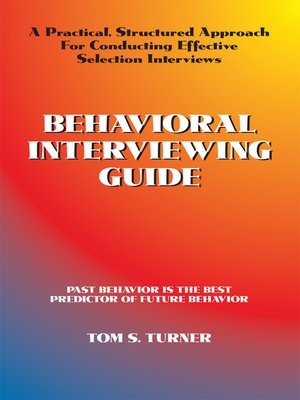Behavioral Interviewing Guide
ebook ∣ A Practical, Structured Approach for Conducting Effective Selection Interviews.
By Tom Turner

Sign up to save your library
With an OverDrive account, you can save your favorite libraries for at-a-glance information about availability. Find out more about OverDrive accounts.
Find this title in Libby, the library reading app by OverDrive.



Search for a digital library with this title
Title found at these libraries:
| Loading... |
Is your organization using the most effective type of interviewing in your hiring and promotional processes? Selection research results indicate that the most valid type of interview to use is a structured, behavioral interview that is focused on the success related knowledge, skills and personal qualities. Behavioral Interviewing Guide provides you with a practical step-by-step approach for planning, conducting and evaluating a structured, behavioral interview. Some of the many supporting documents, guides and techniques included in the book are:
Selection criteria definitions, Twenty five pages of categorized behavioral questions, Generic interview guides for both management and non-management positions, Self assessment quiz, and; Generic behavioural background/reference check guide.
By using the practices and techniques presented in the Behavioral Interview Guide you will hire or promote good performers more often. Is it worth it? You bet! Selection research studies indicate good workers can do twice as much work as poor workers. In addition, each year a good worker is with an organization, they contribute a monetary value equivalent in the range of 70% to 140% of their annual salary. Bad decisions, equipment/material damage, accidents, and replacement hiring fees are just some of the substantial costs associated with hiring or promoting poor workers.
The behavioral interview is based on the practical assumption that a person's past behavior will predict their future behavior. If a person has demonstrated strong initiative, work standards, ability to learn, judgment, flexibility, honesty, attendance etc. in past positions, they will, in all probability, continue to show the same behavior in future positions. The Behavioral Interview Guide provides you with hundreds of good behavioral questions to choose from and explains the necessary structure and steps to ensure interview success.






